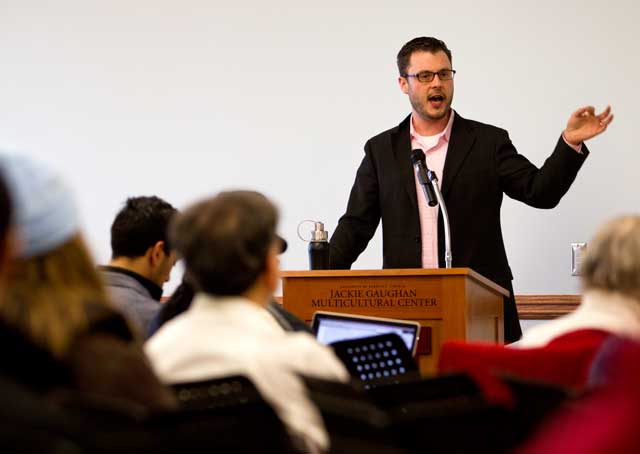By Tyler Williams on March 7th, 2014

President Barack Obama has botched Israeli-Palestinian peace negotiations by favoring Israel, an author said Thursday during his book tour stop at the University of Nebraska-Lincoln.
Josh Ruebner, author of “Shattered Hopes: Obama’s Failure to Broker Israeli-Palestinian Peace,” spoke at the Jackie Gaughan Multicultural Center to elaborate on the premise of his book. Ruebner, national advocacy director of the U.S. Campaign to End the Israeli Occupation, argued that Obama’s first-term policy toward Israel and the Palestinians ultimately continued the U.S. diplomatic tradition of acting as “Israel’s lawyer.”
“It’s important for students and all of America to care about this because we are directly implicit in the oppression in Palestine because of our weapons and politics,” Ruebner said.
Ruebner made a point in his talk to refer to the Israeli-Palestinian issue not as a conflict, but as an apartheid. He made this distinction because conflict implies an interstate war being waged, but that’s not the case in the region, he said.
Instead, he said the Israeli state is oppressing the Palestinian people with military force while there is no Palestinian army to fight them back. Israel is using its superior and U.S.-funded military to systematically destroy and uproot the 750,000 to 1,000,000 Palestinan people who resided in historic Palestine, Ruebner said. Such action falls under the United Nations definition of apartheid, which it recognizes as a crime against humanity.
Ruebner began his lecture by describing three ways Obama differed from previous presidents on the Israeli-Palestinian issue. These differences, Ruebner said, initially presented a chance of successful peace negotiation.
First, Obama came to the White House with a sense of sympathy for the Palestinian people and had a large block of support from Palestinian voters early in his political career, Ruebner said. But during a trip to Cairo in June 2009, Obama pointed out that Christians, Jews and Palestinians all struggle and suffer for a homeland, a departure from the political norm of avoiding Palestinian recognition.
Second, Ruebner said, Obama didn’t appoint a pro-Israel broker for the peace talks. Obama appointed George Mitchell to lead negotiations in Israel. Mitchell had successfully led negotiations between Protestants and Catholics in Northern Ireland in 1998. Mitchell also had no history working for companies or organizations with strong Israeli ties, unlike previous brokers.
Third, unlike previous presidents such as George W. Bush and Bill Clinton, Obama forced Israel to sign agreements that stopped expansion into Palestinian territory.
“I think that people from this state should have understanding of what Palestinians are going through,” Ruebner said. “Palestine’s economy is mostly agricultural, and a large part of Israeli policy is to push these Palestinian farmers off of their family farms.”
Despite these differences from past administrations, however, Obama continued Bush’s policy of sending military aid to Israel, which is funded through U.S. taxes, and has made such aid a cornerstone of his foreign policy in the region, Ruebner said.
Also, Obama eventually caved to pressure from the Israeli Lobby in Washington and appointed Dennis Ross, who was also on the peace team under Bush and Clinton and who co-founded the American Israeli Public Affairs committee (AIPAC), to attend negotiations in Israel. Ross undermined Mitchell’s work, Ruebner said.
Finally, Obama provided political protection to Israel in front of the United Nations when a declaration of war crimes was brought to the general assembly. Allowing Israel to continue its apartheid-like actions against Palestine, apartheid being labeled a crime against humanity by the UN.
Ruebner’s talk ended with a question and answer session where he fielded questions relating to lobbies in Washington, D.C., Boycott Divestment and Sanction campaigns and the future of Israeli-Palestinian relations.
“I really gained from his conclusion where he said people have a right to exist, not countries,” said Zhiman Naser, a freshman exploratory major in attendance.
Ruebner, who received a graduate degree in international affairs from Johns Hopkins University, was invited to speak by the UNL International Socialist Club and co-sponsored by UNL Amnesty International, Citizens for Palestinian Self-Determination and International Socialist Organization-Lincoln. Ruebner also co-founded Jews for Peace in Palestine and Israel in 2000, which has since merged with Jewish Voice for Peace. He is also a former analyst in Middle East Affairs at Congressional Research Service, which provides policy analysis to members of Congress.
